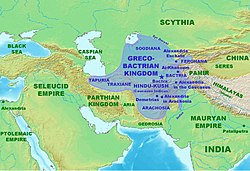Graeco-Bactrian
| Greco-Bactrian Kingdom | ||||||||||||||
|
||||||||||||||
| Capital |
Bactra Alexandria on the Oxus |
|||||||||||||
| Languages |
Greek Bactrian Old Aramaic Sogdian Parthian |
|||||||||||||
| Religion |
Hellenism Zoroastrianism Buddhism |
|||||||||||||
| Government | Monarchy | |||||||||||||
| King | ||||||||||||||
| • | 256–240 BC | Diodotus I | ||||||||||||
| • | 145–130 BC | Heliocles I | ||||||||||||
| Historical era | Antiquity | |||||||||||||
| • | Established | 256 BC | ||||||||||||
| • | Disestablished | 125 BC | ||||||||||||
| Area | ||||||||||||||
| • | 184 BC | 2,500,000 km² (965,255 sq mi) | ||||||||||||
|
||||||||||||||
The Greco-Bactrian Kingdom was – along with the Indo-Greek Kingdom – the easternmost part of the Hellenistic world, covering Bactria and Sogdiana in Central Asia from 250 to 125 BC. It was centered on the north of present-day Afghanistan. The expansion of the Greco-Bactrians into present-day eastern Afghanistan and Pakistan from 180 BC established the Indo-Greek Kingdom, which was to last until around 10 AD.
Diodotus, the satrap of Bactria (and probably the surrounding provinces) founded the Greco-Bactrian Kingdom when he seceded from the Seleucid Empire around 250 BC and became King Diodotus I of Bactria. The preserved ancient sources (see below) are somewhat contradictory, and the exact date of Bactrian independence has not been settled. Somewhat simplified, there is a high chronology (c. 255 BC) and a low chronology (c. 246 BC) for Diodotos’ secession. The high chronology has the advantage of explaining why the Seleucid king Antiochus II issued very few coins in Bactria, as Diodotos would have become independent there early in Antiochus' reign. On the other hand, the low chronology, from the mid-240s BC, has the advantage of connecting the secession of Diodotus I with the Third Syrian War, a catastrophic conflict for the Seleucid Empire.
Diodotus, the governor of the thousand cities of Bactria (Latin: Theodotus, mille urbium Bactrianarum praefectus), defected and proclaimed himself king; all the other people of the Orient followed his example and seceded from the Macedonians. (Justin, XLI,4)
The new kingdom, highly urbanized and considered as one of the richest of the Orient (opulentissimum illud mille urbium Bactrianum imperium "The extremely prosperous Bactrian empire of the thousand cities" Justin, XLI,1 ), was to further grow in power and engage in territorial expansion to the east and the west:
The Greeks who caused Bactria to revolt grew so powerful on account of the fertility of the country that they became masters, not only of Ariana, but also of India, as Apollodorus of Artemita says: and more tribes were subdued by them than by Alexander... Their cities were Bactra (also called Zariaspa, through which flows a river bearing the same name and emptying into the Oxus), and Darapsa, and several others. Among these was Eucratidia, which was named after its ruler. (Strabo, XI.XI.I)
...
Wikipedia

